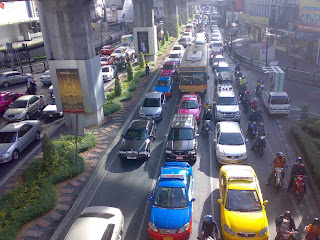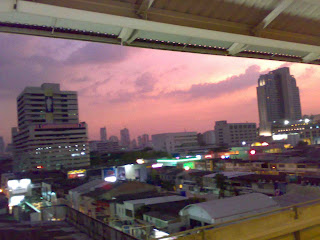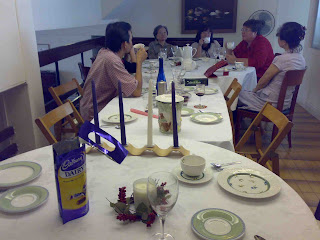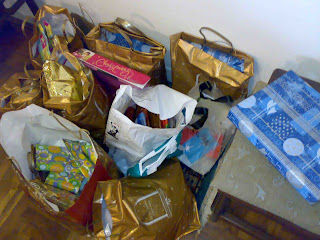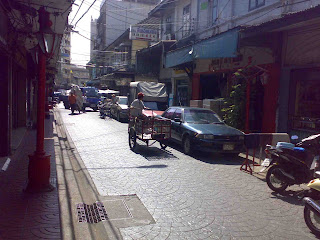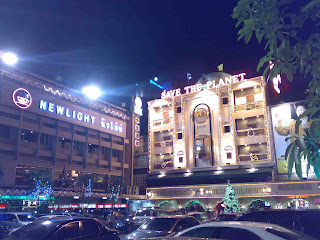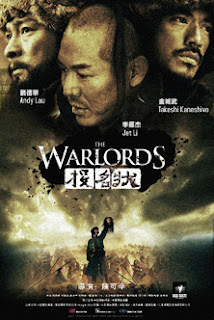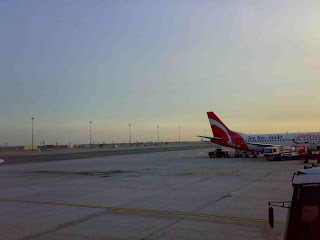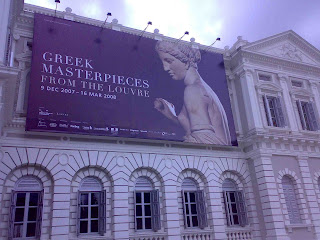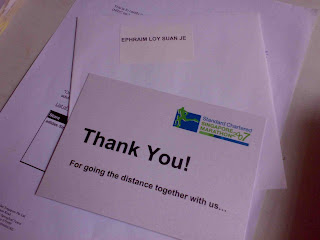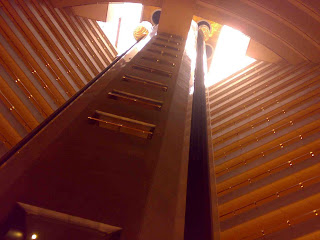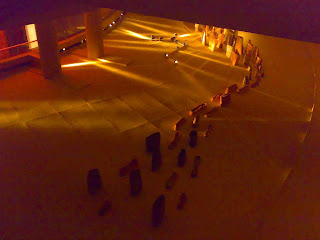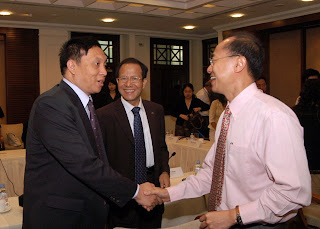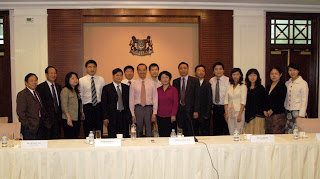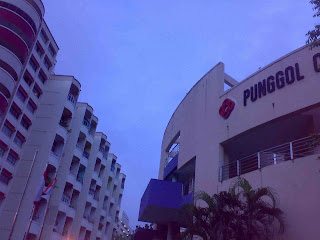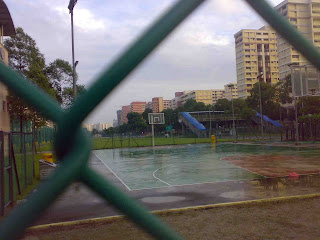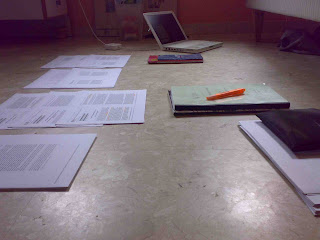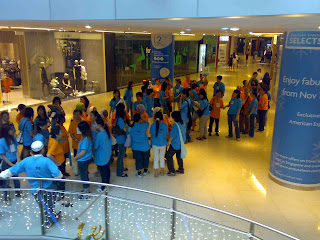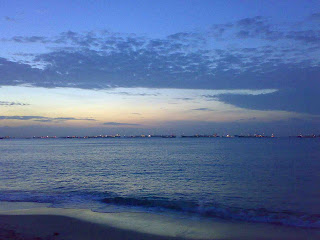[Interviews]Ever since I started blogging I've had requests for interviews. Most of the time, if I am free, I would grant and reply to interviews. Here are some of them over the past year.
On Foreign Affairs Minister blogging - The Straits Times
Q: Who suggested that the Minister try blogging? Why did you decide to let him use your blog to write?
A: It was an impromptu thing. One night over dinner we were having a casual chat on youth activities, discussions and new initiatives with the rest of the Young PAP members. After that, we delved into the topic of blogs. The idea of "guest blogging" popped up and I thought why not. In fact I thought it was a good idea. Minister was excited that he started his first post via email that very night. It was a sincere effort, impromptu and personal. It was like being struck by lightning - it happened so fast. I was surprised by his enthusiasm. We may have podcasts soon but we are still experimenting how to do it best. Minister is learning too. I hope people will understand and give us time.
Q: Some people have left sceptical comments about the Minister blogging, what's you take on those? Has the Minister's presence on your blog affected readership? What sort of feedback have you got?
A: Many life experiences have shown that you can please everyone be it what you do or what you say. As long as it is constructive nothing else matters. You can't force everyone to agree with you. But there will be a handful that supports what you do. And those are comments that spur me on, to make me tell myself: "Hey, it isn't that bad after all." People learn and later in time they appreciate the things you do.
As long it is a sincere effort, readership is not the most important. I don't crack my head to think of what to do to attract readers or what controversial stuff to say. Most are on issues close to me. The numbers have been heartening. A handful of my peers in the branch are regular readers as well. Others have sent me encouraging email about the posts. This blog effort has to be interactive - to be a two-way thing. In the long run, hopefully it engages the community - to get people to come forward to share their experiences or to help out in the community to make that change. No point just criticise sit there and watch. You disagree with something, you have an idea, it is constructive, send it in. We can talk about it, debate and strike a balance. Minister does read through comments posted when he has time.
On blogging and politicians - Lianhe Zaobao
Q: Do you think blogging is a good way to reach out to Singaporeans?
A: Most of the younger and and middle-aged Singaporeans spend a lot of time on the Internet these days be it gaming or MSN and the like. It is perhaps a culture. I would liken blogging to the modern "coffee shop" talk for the new generation. They gripe on issues, complain and discuss a whole lot of stuff online most of which you can hear about in coffee shops. And most are about the Government.
Q: Given that most political blogs are in English, do you see the Chinese/Malay/Indian-speaking community lacking a voice online?
A: I do see it as a growing trend. There may be a demand for blogs of other languages although I have not come across any yet. But I think most of the younger ones like me tend to prefer conversing in English.
Q: Personally, how long have you been blogging? How often do you check your blog for new comments? Do you find blogging addictive?
A: I started blogging in 2002. Initially it was a document of my daily life and interesting accounts but I feel that it is becoming more of a reflective tool and when I look back, I see how I have matured. I usually check my blog once or twice a day for comments. Blogging is more of a hobby for me. Although now I tend to carry a notebook wherever I go to jot down interesting ideas and things to blog about. Although I do try to make my blog interesting for readers I won't resort to unconventional methods to hook readers. Usually what you read about are thoughts that are going through my mind - however not all of it.
Q: How often do you read other people's blogs? Which blogs do you like best?
A: My daily read is tomorrow.sg. I find it interesting and it is concise and has bite-sized information. Another interesting blog that I read when I have the time is mr brown.com. Actually I read it more often after Senior Minister of State for Information, Communications and the Arts Dr Balaji Sadasivan mentioned in a dialogue that the posts there are good. I find it pretty hilarious and honest. I also do read blogs of members of the opposition. They can be pretty interesting at times.
Q: Do you read foreign countries' politicians' blogs? how different are they from our local ones? What are your views on them?
A: Foreign politician's blogs are lengthy and more in-depth. Perhaps due to certain political sensitivities in Singapore, our blogs by politicians may not be as interesting as there are constraints. But I say, let's give them a chance. The post-65 MPs have started blogging albeit on non-political stuff. But it is a good start. I believe it takes time.
Q: Some people have argued that politicians should blog about serious topics/issues. What are your views?
A: First we have to ask ourselves if we are mature enough. Simple posts can already generate so much complaints. It really depends on the target audience. As the blogosphere matures, this may in turn work out. But seriously discussing about policies will have varied opinions and criticisms. You can't please everyone. It's all about the balance. Once you get the balance on the perspectives, then you hit the jackpot. We are still learning.
Q: Do you feel it is important for politicians to use real name when blogging?
A: There are pros and cons. Ultimately it is the content and the interaction online that matters.
Q: How do you view the combined blog that the P65 parliamentarians have set up?
A: It is a good effort. But they should focus on their niche areas (arts, sports etc.). By doing that they create a vibrant all-rounded community representing the post-65 generation.
Q: How do you think blogging as a trend or fad that will fade eventually?
A: Blogging has been increasingly getting more popular. It is imperative that the credibility of the blogger is not undermined. It may not fade but could evolve into something different maybe 5, 10 years later. And I hope to see something good come out of it. It won't die down so easily. Now even SPH has gone online through their effort promoting STOMP.
Q: Do you think the government is putting enough effort to engage the internet community?
A: I hope the Government has begun to realise that there is a growing audience out there. People want their views to be heard. You can't just sweep it under the carpet or pretend it does not exist. I'm sure they can slowly engage the Internet community. At least they are trying. They need to reveal a more personal side - the more caring and down to earth nature of the Government rather than one that is high above and drives everything - this will make people more apathetic. They have to understand the importance and harness the power of the Internet to connect with ordinary people like you and me.
Q: Do you think the internet is a useful tool of communicating most accurately and with least censorship to the general public?
A: People get misunderstood all the time. Sometimes something online may be taken out of context, or read with too much depth. Although there may be less censorship, they have to be wary of what they say - back it up with facts and prepare to be scrutinised by the public.
On various topics related to Singapore - UNSW student
Q: Have you ever seriously considered emigrating from Singapore?
A: No. Although the lure of some countries are irresistible.
Q: If you could choose to migrate to any country of your choice, would you do so? If so, what might prompt your decision to emigrate from Singapore? Please select any applicable general reasons from the following list, and indicate any other general reasons you might have.
A: I guess I most probably not as my family are still in Singapore. Unless we go over together but it probably won't be the case as my family's quite large. I treasure my relationship with my family very much and am quite a home-boy is a sense. Although I can adapt to life abroad easily, I will treasure the things that I have back at home.
Economic, Career, Political, Family, Lifestyle, Education.
Q: Would you experience hesitation in making the decision to emigrate from Singapore? If so, what would be the factors that might cause you to hesitate?
A: The feeling of leaving behind what I have been exposed to for the last 24 years. Essentially, Singapore is my home. I've had excellent memories and this is where I grew up.
Q: What are your favourite aspects of life in Singapore?
A: It should be the culture. It's like rojak - you have little nuggets of everything in one dish. Of course, the food, the cleanliness (although it's getting more expensive to keep Singapore Clean and Green). Conversely, Singapore is a rather nanny state - the Government does and plans out almost everything for us - such that it can get boring at times.
Q: What are your lease favourite aspects of life in Singapore?
A: Globalisation has caused Singapore to open up to import foreign talent. The excessive dilution of Singapore with foreign talent will cause problems. The Government has to re-look and formulate proper policies to integrate foreign talent with the local community so that we can move forward as a whole. What really annoys me is that some foreigners do not comply with our habits and our Singaporean-ness. For example, I saw a foreign worker unzipping his pants and peeing in the bushes. It totally shocked me.
Q: "Singapore is a relentlessly G-rated experience, micromanaged by a state that has the look and feel of a very large corporation... There's a certain white-shirted constraint, an absolute humorlessness in the way Singapore Ltd. operates; conformity here is the prime directive, and the fuzzier brands of creativity are in extremely short supply... [Singapore feels like] Disneyland with the death penalty." William Gibson, 1993.
What are your views on this subject?
A: White is a nice colour and can be matched with many other colours. We cannot deny the fact that we have been doing well. Our political stability has allowed us to achieve much more that our neighbouring countries have. But we must continue to improve, to move forward. I know that there's a great call to be more open, to accept more divergent views. I believe we should do that or at least allow that to happen. Pluralism is important in this time and age. And since Singapore is an inclusive society (or so we hope to achieve that), we should loosen the reins a little. We can see that the Government is allowing this to happen (IRs, Crazy Horse, F1). Even MM's change of tact towards homosexuals show that hey, we are opening up - but at what pace seems to be the crux of the argument.
Q: It has been argued that Asian countries like Singapore have a unique set of beliefs distinct from liberal Western values. In Singapore, these "Asian values" are manifested in the form of "shared values." These "shared values" promote placing the interests of society above the interests of the individual, and valuing consensus instead of resorting to conflict.
Advocates have argued that "Asian values" promote unity in the population, are a source of pride to Asians, and have been crucial to the economic success of Singapore. Critics argue that the concept of "Asian values" is used to justify non-democratic rule in Asian countries like Singapore.
What are your views on this subject?
A: Just nice that I am taking a course on Democracy this term. To me, these shared values are a yardstick to follow. How many people actually know these or follow them? Let's be honest here, man is selfish.
Q: "The single decisive factor that made for Singapore's development [from an undeveloped country in 1965 to a developed country at present time] was the ability of its ministers and the high quality of civil servants who supported them." Lee Kuan Yew, 2000.
What are your views on this subject?
A: Due credit should be given to our forefathers who have transformed Singapore. Let them take the credit but let's also tap on their advice but when it is time to let go, it is time to let go. The younger generation listen to the words of wisdom, add in their perspectives and come up with something exciting. But then again, sometimes we have to "play it safe" and take the standard route and that boils down to upbringing. How many of our generation can break out of the norm to take challenges? How many can live a life dedicated to his/her passion? Do we want to be trendsetters or merely followers?
Q: Do you feel that ethnic minorities in Singapore have been discriminated against? If so, in which way(s)?
A: Definitely not. I believe that meritocracy allows everyone to excel. Ordinary people with humble backgrounds have been able to rise through the ranks regardless of race.
Q: Constituting over 75% of Singapore's population, the ethnic Chinese are numerically dominant. This dominance has extended to the economic realm, with the average Chinese Singaporean earning more than the average Malay Singaporean or Indian Singaporean.
Lily Rahim has argued that ethnic minorities in Singapore are absolutely disadvantaged compared to ethnic Chinese Singaporeans, particularly in the areas of education and politics, and this is the result of poor government policies. G. Shantakumar has argued that the Singapore government has already established the preconditions necessary for the advancement of racial minorities, and it is therefore incumbent upon the minorities themselves to correct these shortfalls.
What are your views on this subject, and whose statement do you agree with more?
A: In essence, the Chinese are a majority in Singapore. When you have more of a certain type, the given set is more and chances are that there is a higher possibility of such a type dominating areas such as education and politics.
More of a certain kind = higher chance. I guess policies that the Government makes should set out to not marginalise a particular group. That in essence is what I consider equality. Yes, people in societies are never equal but they are given the chance and the opportunity and that is what is important.
Q: Former Prime Minister Goh Chok Tong has argued that Singaporeans who would leave the country in times of need are "quitters," whereas those who would remain behind, or those who would emigrate but continue to feel for Singapore are "stayers."
What are your views on this subject? How do you view emigrant Singaporeans?
A: I guess it is personal choice. Who are we to restrict Singaporeans from emigrating? Some of my family members have done that and it draws us apart.
Q: How did you come to join the Young PAP? What made you decide to join the Young PAP, and how do you feel about your decision?
A: I was asked to join the Young PAP after observing what goes on at Meet-the-People sessions. It was an eye-opening experience and allowed me to learn more about how Government policies impact the people. Being part of the Young PAP keeps me close to the ground and it really shows a different side of Singapore. Although it is time consuming as I am there almost every week, I have never regretted joining.
On blogging in general - Pioneer JC student
Q: Would you encourage blogging?
A: For me, blogging is a tool to express my thoughts. I blog to allow friends and family members who I seldom meet so that we can keep in touch. Blogging is a popular trend. However, some bloggers tend to fall foul of the law. It is imperative that one must know the rules. Whether online or offline the laws still do apply.
Q: Do you find blogging beneficial? Yes/no, why?
A: Sometimes you can share thoughts which are private. I know some people who use blogs as a tool to disseminate messages. Some universities use blogging as a tool to discuss class work - it's like an online community thing. Other times your blog tends to reveal too much about yourself. It may lead to identity theft - someone who knows a lot about you can impersonate you. The anonymity of the Internet can be misused - people can say what they want without giving away their identity.
Q: What do you think is the most beneficial quality of blogging?
A: It allows room for interaction among the Internet community. Well everyone's complaining that there is not much freedom of speech in Singapore. Perhaps blogs can rid one of that void. At least there is not much restriction on what you can say on the Internet. Of course there is some form of penalty if you offend people - eg sedition, defamation etc.
Q: Your take on the current blogging situation in Singapore?
A: Blogging in Singapore is a growing trend. Not many people knew about blogging back then. Some famous bloggers like Wendy Cheng emerged through Singtel's inaugural Moblog contest some years back. I won't say that my blog is a good quality blog - it is perhaps only about my thoughts. Good bloggers are those that discuss issues in depth with supporting research and clear arguments. To reach that level you need to dedicate time to do research. Wendy Cheng is my opinion is not a good blogger - more likely a beauty princess yearning to be a beauty queen.
Q: Do you think our proposal is going to work out? (They proposed a blogging festival)
A: This is not the first time such a festival is held. But the competition for "Best Blog Design¨, "Best Entry" etc sounds interesting. It may be a platform to encourage and further liven up the blog scene in Singapore.
Q: What is the most promising aspect of our proposal?
A: I think it is a good step. However you may want to note that this is not the first time such a competition/festival has been held though. There have been workshops that teach responsible blogging and Tomorrow.sg organised a blog festival/convention last year.
Q: Do you feel that there are any disadvantages of blogging?
A: Blogging is fine if the blogger reports the truth but when the truth is distorted, the Government can take action - Mr Brown is one good example. One also has to be very careful when blogging is on racial and religious topics.
Q: Are these disadvantages a call for concern?
A: It is a concern for the Government that rumours can be spread like wildfire on the Internet. As long as your argument is based on facts, it is very unlikely that you will get into trouble with the law. One must know the limits that he/she can tread. Go out of that boundary and one may fall foul of the law.
Q: Would you support our proposal? Yes/no, why?
A: You have to try to position this event in a more novel way. Think of how to make it different from the rest of the events. What is the unique selling point? How can others benefit from the event? How do you plan to raise awareness about about the negative aspects of blogging (flaming, racism, etc) - by inviting professionals to share their ideas?
On citizen journalism - NP student
Q:What are your views on this new form of reporting news (citizen journalism)?
A: I think with the advent of technology, things will change. New forms of journalism will evolve, some good, some bad. And things will happen very fast. So this form of citizen journalism is still quite fresh but, personally, I feel it enables the general public to participate – especially more so the younger ones in the future.
Q: Do you think that citizen journalism gives a voice to the public? Elaborate.
A: Definitely. Because journalists cannot be everywhere everytime. Although there are many mediums that give voice to the public – like forums in the papers or online forums – it is the immediate impact of photos or videos that grabs attention. It’s instantaneous without going through the whole gatekeeping process but this can be harmful if it involves sensitive topics such as race and religion.
And more so, the younger generation finds it a hassle to craft nicely worded letters to the press. So the phrase “a picture paints a thousand words” is apt in such a generation.
Q: Do you think this “voice” is misused, with the public making use of this medium to probe into the privacy of others? Explain.
A: To some extent yes. But one has to really note the difference between “private space” and “public space”. I don’t think misused is the word. I guess the word to describe it more appropriately is “watchdog”.
Then again, we should not encourage a “watchdog” mentality or else it would be very scary to even leave the house to buy something – with so many pairs of eyes watching your every move. It kinds of remind me of how it is like to “live in fear” all the time.
On the filpside, this “watchdog” mentality can be used to set things right – like the reports on how traffic policemen flouted the rules by parking illegally.
Q: In your opinion, is citizen journalism good or bad? Explain.
A: No one really knows whether it is good or bad. However, critics argue that citizen journalism is not professional journalism. If you talk about encouraging the active participation of a community in a society, then I would say that it has been effective.
Q: Do you think readers trust the credibility of these citizen journalists in the reporting of the news?
A: It all boils down to technology. Photos can be doctored easily so where’s the truth in them? The advantage of mainstream media is such that journalists are able to verify the source and dig deeper into the facts. And that is why mainstream media is still seen to be as credible as it should be. Until citizen journalism catches up in that aspect, we would ultimately have to turn to mainstream media.
Q: Should the public take all these news with a pinch of salt? Elaborate.
A: It really depends on the source of the information. Most things reported are usually personal accounts but if you want to get the expert views then STOMP is not the place. At least not yet. But in the future, perhaps.
Q: Do you think the public is trying to use this tool to get back at people whom they are unhappy with?
A: I think it is more of a “watchdog” - a “watchdog” to check the government.
Q: Where do you see citizen journalism heading five years from now?
A: I think this concept will develop further. How much further we don’t know. The sustainability is what matters.
Q: What do you think of STOMP using the public’s news stories to attract readers to its site? Is it exploitation?
A: Citizens do get rewarded for their stories. But if they really want to let the world know what is going on they would not really care for rewards.
Q: Why do you think the public is so engaged in the reporting of news?
A: The very essence of citizens reporting the news that keeps others engaged is that they can share their views instantly using the “comment” function. It gathers different views and one is able to see what others think of a particular topic or behaviour.
Q: Do you feel that the Internet is changing the way news is reported?
A: I would say the Internet is changing the way how citizens look at news. One can get instant updates just at the click of a mouse. It is definitely changing the habits of hwo news content is viewed but in terms of style it is more or less the same – just offline content republished online.
Q: Do you participate in the posting of news content online? List and describe.
A: Only blogging. I used to participate in STOMP’s forums but felt it is a waste of my time. Perhaps, the nature on online forums is that it allows anonymity but with anoymity, you really do not know who you are dealing with. More often than not there are even flaming wars online and such behaviour is unruly and is time consuming especially when people argue and attack others on minor things.
Q: If yes, why do you post these news content?
A: I guess blogging allows me to share with others about my life and what I do. Singaporeans are so busy, it serves as an avenue to catch up and update yourself with what your friends are doing. And the best way is to just read his or her personal blog.
Q: What do you think of the website, STOMP?
A: STOMP is just SPH’s way of reinventing itself. It does not want to lose in the competition for eyeballs and therefore has to think of ways to attract the online audience.
Q: Do you like some of the news/story ideas that are posted on the site? List and explain.
A: I seldom participate or look at the stories on STOMP. They are mostly content on ugly Singaporeans which you can see if you observe carefully for yourself.
There are more though - some on radio and some on TV. I have reproduced an array of questions from interviewers of various sectors so you can have a different feel of what different people ask.

